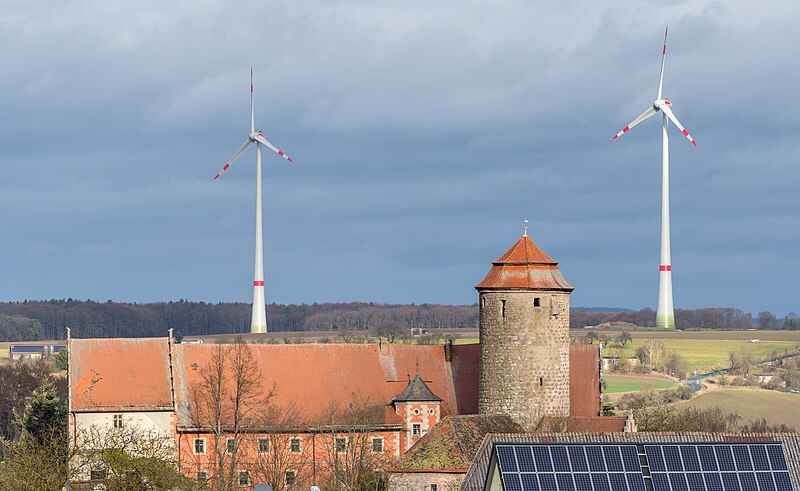
In recent years Europe’s energy landscape has been fundamentally reshaped by the ongoing war between Russia and Ukraine. In particular, it has exposed deep vulnerabilities and has forced policymakers in the EU to rethink their approach to energy security. For decades, the EU and its Member States relied heavily on Russian natural gas, with countries like Germany importing over 50% of their gas from Russia before the conflict. However, it has become apparent that due to the weaponization of energy via supply cuts, skyrocketing prices, and infrastructure sabotage, there is an urgent and pressing need for a resilient, diversified, and sustainable energy strategy in Europe. In order to achieve this, European decision-makers must act decisively to ensure energy independence from Russia while also balancing economic feasibility and climate commitments.
The first course of action adopted by several European governments has been to attempt to diversify their energy sources which has resulted, there in a great surge of liquefied natural gas (LNG) imports from the United States and Qatar, with LNG terminals in Spain, the Netherlands, and Germany playing a crucial role in the supply chain. Moreover, the Southern Gas Corridor, which brings Caspian gas to Europe, has also gained strategic importance. However, the diversification of energy sources must go beyond simply replacing Russian gas with other fossil fuel sources. Europe should enhance its energy partnerships with North African nations such as Algeria and Libya while also developing stronger energetic relations with Norway and Azerbaijan. These efforts can result in the development of a more balanced and secure supply chain while also reducing the potential risk of coercion by any single energy provider.
Even though in the short term, the EU should prioritize securing alternative gas suppliers, the long-term answer to Europe’s energy security lies in a rapid transition towards renewable energy sources. The European Green Deal aims to make the EU climate-neutral by 2050, and the war has accelerated the urgency of this transition. Investment in wind, solar, and green hydrogen must, therefore, be prioritized, not only for environmental reasons but also to ensure the energy sovereignty of the EU. For instance, by investing in offshore wind projects in the North Sea, solar farms in Southern Europe, and carrying out improvements in the interregional grid, the dependence on external suppliers could be drastically reduced. Even though the REPowerEU plan, which seeks to reduce Russian energy imports by 2030, calls for doubling renewable energy capacity, it is necessary that policymakers also streamline bureaucratic processes to fast-track the approval of clean energy projects. In many EU countries, renewable energy initiatives and projects face delays due to excessive permitting requirements, and thus cutting red tape is an essential factor to ensuring a swift transition.
As mentioned earlier, given that renewables remain intermittent energy sources, Europe’s energy transition cannot rely solely on them in the short term. This is where nuclear power must be reconsidered as a stable and low-carbon alternative. However, this remains a contentious issue amongst EU member states. For instance, while France generates over 70% of its electricity from nuclear energy, Germany has decided to shut down its remaining nuclear plants in 2023, despite ongoing energy shortages. Policymakers must adopt a pragmatic rather than ideological approach by supporting modern nuclear technologies, including small modular reactors, which offer greater flexibility and safety compared to traditional nuclear plants. If Europe is serious about achieving energy security and reducing emissions, nuclear power should be considered as part of the equation.
Energy security is not just about supply; it is also about resilience, and European countries must invest in the required infrastructure for the enhancement of energy storage and distribution. This can be achieved by expanding natural gas storage facilities, improving cross-border electricity grids, and developing strategic reserves, which are essential to preventing future crises. Moreover, recent technological developments in battery storage for renewables and advancements in hydrogen storage technology could also play a key role in ensuring that green energy can be used even when production fluctuates. Additionally, energy efficiency should not be overlooked. Demand-side measures, such as improving building insulation, modernizing industrial energy use, and promoting smart grids, could reduce overall energy consumption, making Europe less vulnerable to supply disruptions.
In conclusion, the Russia-Ukraine war should serve as a wake-up call for European policymakers, highlighting the dangers of energy dependence on authoritarian regimes. The path to energy security requires a multifaceted approach: diversifying suppliers, investing in renewables, re-evaluating nuclear power, and modernizing infrastructure. If Europe wants to achieve energetic stability, decision-makers must act swiftly and pragmatically by prioritizing and combining policies that not only ensure short-term stability but also foster long-term resilience. If Europe succeeds in this endeavor, it will not only protect itself from future energy crises but also lead the global transition toward a more secure and sustainable energy future.
By The European Institute for International Relations















